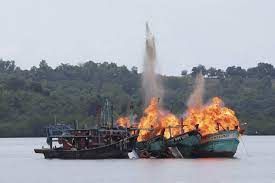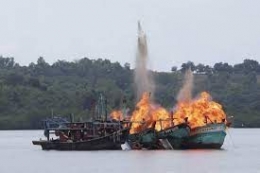Located between the continents of Asia and Australia, as well as the Indian Ocean and the Pacific Ocean geo-politically, Indonesia's location is very strategic, so that Indonesia becomes the world's maritime axis in the context of global trade or The Global Supply Chain System that connects the Asia-Pacific Region with Australia.
With this, of course, Indonesia has the potential for sustainable marine fish resources and is vulnerable to violations committed by other countries.
To prevent illegal fishing activities in Indonesian waters by foreign vessels, Indonesia through the Ministry of Maritime Affairs and Fisheries (KKP) has made diplomatic efforts with neighboring countries whose fishing vessels often enter Indonesian waters.
In the era of Mrs. Susi Pudjiastuti's leadership as Minister of Maritime Affairs and Fisheries, Indonesia has held a meeting with several Ambassadors of neighboring countries to convey the priority policies of the KKP for the next 5 years including the seriousness in eradicating IUU fishing practices.
In meetings with friendly countries and in international forums, the CTF always invites other countries to commit to eradicating IUU fishing.
On several other occasions, the KKP also submitted a letter to the Ministry of Foreign Affairs (Kemenlu) to send Diplomatic Notes to certain countries to prevent their ships from carrying out IUU fishing in Indonesia.
Flashback to 2011, there were 0-30 percent tuna fish, of which approximately 3,889-6,500 tonnes were exported to the United States illegally and unreported.
According to FAO data, about 90% of the world's fish stocks have been exploited on a large scale and according to 2015 WWF data it threatens more than 85% of fish stocks globally and threatens 65% of Indonesia's coral reefs.
According to Veerle, from RUSI, Indonesia is experiencing illegal fishing because the infrastructure and regulations that are less stringent from the government have not yet been fulfilled, there is also no awareness among fishermen themselves, and they still do not understand the fishing zones that may or may not be caught, which causes Many Indonesian fishermen have been arrested by the maritime security forces of neighboring countries.
This not only threatens fish stocks, but also has a negative impact on the economic activities of small-scale fishermen. Therefore, the government of Joko Widodo, the first Cabinet, established 3 pillars, including the pillar of sovereignty, the pillar of sustainability and the pillar of welfare.
The government also carried out a moratorium on foreign vessels and also a ban on transshipment in 2014, the establishment of the Illegal Fishing Eradication Task Force, an analysis of the evaluation of ex-foreign fishing vessels and in 2016 a ban on ex-foreign vessels and foreign capital in the capture fisheries sector was established.
And also to support the first pillar, namely the pillar of sovereignty, Indonesia sinks ships that commit illegal fishing crimes to provide a deterrent effect.
Through analysis and evaluation activities, it was found that all Anev object vessels violated the laws and regulations related to fisheries.
There are 12 modes of operation for IUU Fishing in Indonesia including:
- Forgery of ship registration documents;
- Double flagging & double registered;
- Catching fish without shipping permits/documents (SLO and SPB);
- Illegal ship modification (mark down, change call sign, engine);
- Using foreign skippers and crew;
- Not activating ship monitoring transmitters (VMS and AIS);
- Illegal Transshipment;
- Forgery of logbook data;
- Violation of fishing lanes;
- Use of prohibited fishing gear;
- Not having/partnering with a Fish Processing Unit;
- Do not land fish at the port specified in the permit.
Anev activities also reveal the fact that illegal fishing activities are also followed by various types of other crimes such as trafficking in persons, slavery, evasion of tax payments, corruption, money laundering, illegal fuel transactions, and smuggling of goods and people.
(RM)
Baca konten-konten menarik Kompasiana langsung dari smartphone kamu. Follow channel WhatsApp Kompasiana sekarang di sini: https://whatsapp.com/channel/0029VaYjYaL4Spk7WflFYJ2H







